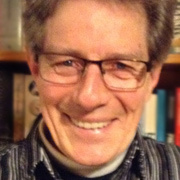
Dick Weir
Broadcaster Dick Weir is best known as a longtime Radio New Zealand radio host; his distinctive 'caramel' voice is familiar to generations of Kiwi kids, via children’s radio slots like the Dick Weir Sunday Show (1979 - 1988), and nightly kids’ show Ears (1988 - 1996), where he performed dramas like Space Station Z and characters like Letterbox Lizard.
On screen, Weir’s voice has narrated hundreds of documentaries and commercials, although he is probably best remembered as the first host of 80s after-school news programme The Video Dispatch.
Born in Devonport in 1948, Weir grew up in Invercargill, where his time at James Hargest High School was dominated by involvement in drama and the politics club. A childhood fascination with broadcasting was fuelled by visits to the local radio studio, and the chance to take part in 4YA’s children’s sessions. Weir’s first acting assignment was at age 16, in a radio play produced by Bernard Kearns.
A mid 60s acting apprenticeship at Dunedin's Playhouse was followed by time with the New Zealand Players Drama Quartet in Wellington, which included touring schools. Weir gained work with the NZBC and was posted to Christchurch's 3ZB and CHTV-3, where he was a staff announcer on both radio and TV.
In 1971 he created TV kids show It’s a Weird World with Jim Hopkins, and found himself interacting with a Hopkins-operated puppet called Grapple. Weir "wanted desperately to turn my children’s theatre experience into children’s radio and TV programmes." On 3ZB, he launched the characters Bertie the Germ and his partner Bertina.
Following an OE, Weir returned to NZ, and began at 2ZB in Wellington in late 1972. At WNTV-1 he presented Concentration, a game show, and children’s science programme Here’s How. It was the early days of TV-making in NZ, and Weir remembers a lack of prompters or scripts; he recalls the producer of Here’s How, a presenter imported from from Britain’s Southern Television, "having to ask for take after take as co-presenter Cathy Saunders and I tried to make the various experiments work for television."
Weir also hosted Cliff Richard in a special seminar broadcast for teens called Christianity in The Modern World. From 1974 to 1977 Weir ran a show on 2ZB called Storytime (live readings of stories for children). With his experience in children’s broadcasting, he was a natural fit to front new TVNZ show The Video Dispatch, which launched in 1980.
The series screened after Olly Ohlson's After School show on Tuesdays and Thursdays, and Weir became a familiar face to pre-teen Kiwi viewers. He introduced stories ranging from the Falklands War to a DIY Wellington Polytech computer called 'Poly'. Weir recalls particular excitement at providing a forum for kids to engage with current affairs, and credits producer Chris Mitson's "rare talent for distilling complex stories for an audience of children." In 1981 The Video Dispatch won a Feltex Award for Best Children’s Show.
One series of stories was filmed in the Beehive studio, where kids debated topical issues and asked questions of politicians and the TVNZ Political Editor. In another series a box of children’s questions were taken to Prime Minister Muldoon at the National Party conference, for a filmed Q&A session.
A six-minute long radio version of The Video Dispatch played on the Dick Weir Sunday Show, under the title Newsbeat. In March 1983 the show won the only interview granted by Prince Edward during a year spent teaching at Wanganui Collegiate, where he answered questions submitted by children across New Zealand.
The same year Weir hosted the live telecast of NZ Music Awards from the Michael Fowler Centre. He was also a regular in the line-up of celebrities seeking donations on live Telethon broadcasts.
Needing a break from hectic six-day weeks, Weir moved south to Dunedin in 1983 to host the 4ZB breakfast session (Lloyd Scott took over The Video Dispatch presenting chair). An opportunity in radio drama drew him back to Wellington two years later, which led to beloved radio show Ears.
Weir has lent his deep tones to everything from party political broadcasts (for the Labour Party’s 1978 campaign) and NZ Dairy Board promos, to A Fair Deal (1979), Greg Stitt’s controversial documentary about poverty in Aotearoa. Weir also narrated award-winning mini-series Erebus: The Aftermath (1987) and Natural History Unit doco Wild South - Mangroves (1984).
In the five decades since Weir’s first professional broadcast in a 1965 radio drama, he has also helped raise six children, and gained two grandchildren. He has tutored in broadcasting craft and early childhood storytelling and drama at Whitireia Polytechnic; and toured schools and museums with storytelling programmes, from performing to crowds of kids at Te Papa to reading A Christmas Carol at Dowse Art Museum.
Weir has received national and international awards for his work, including the 1983 Bill Toft Memorial Award for Radio Broadcaster of the Year, and another for Educational and Public Affairs Broadcasting from Ohio State University. In 1998 he was awarded a Queen's Service Medal for services to children's broadcasting.
In 2009 he assumed broadcaster emeritus status, when he donned a top hat and cape, and joined his son Barnaby (Black Seeds) Weir's touring show Fly My Pretties as the onstage storyteller.
Sources include
Dick Weir
‘Playing Favourites with Barnaby Weir and Dick Weir’ (Radio Documentary) Presenter Kim Hill (Radio New Zealand National, 9 May 2009) Accessed 21 September 2015
'Dick Weir - Bio' Amplifier website. Accessed 21 September 2015